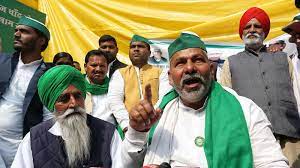CHANDIGARH: Hours before the Punjab farmers announced resumption of their ‘Delhi-Chalo’ protest march on February 21, the Bhartiya Kisan Union (Tikait) leader Rakesh Tikait has warned that the ongoing agitation for guaranteed minimum support price could surpass the duration of the previous protest of 2020-21, which lasted for 13 months.
The announcement comes close on the heels of the collective rejection of government’s proposal to procure five crops on minimum support price for a period of five years by various farmer associations and agri-experts. Tikait, a prominent figure in the farmers’ movement, stated, “The government has prevented the farmers from going to Delhi. This time, a movement will be initiated that will last not just for 13 months but much longer. We will make sure they do not come to power in 2024.”
This declaration has set the tone for an intensified protest, as farmer leaders prepare to resume the Dilli-Chalo march from Haryana borders, alleging that the government was not taking their concerns seriously but adopting time-buying tactics. Addressing a Kisan Mahapanchayat, Bin Jijaula of Shamli district, on Tuesday, Tikait criticized the government and labeled its policies as anti-farmer. He stated that the farmers’ demands have persisted for long, but they were still not receiving a fair price for their crops, leading to a continuous escalation of their problems. He also urged farmers to set aside differences, raise their voices collectively and ensure a huge presence of tractors on roads leading to Delhi on February 26 and 27.
The Bhartiya Kisan Union (Tikait) has also called for a tractor march in Uttar Pradesh and Haryana to bolster the ongoing agitation. However, the SKM, representing 40 farmer unions, has not confirmed its participation in the “Dilli-Chalo” protest.
In the backdrop of four rounds of failed talks between farmers and ministers, the government could contemplate a new strategy to address the growing unrest. The agitation, which originated in Punjab on February 13, is now gaining traction in Haryana and UP.


